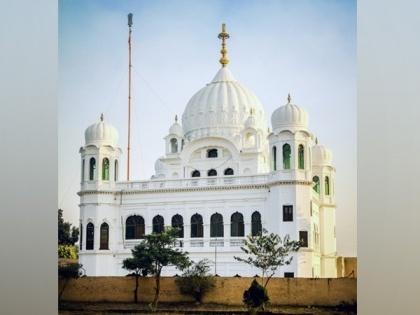Khalistan: A forbidding prospective at best
By ANI | Published: April 21, 2020 10:46 AM2020-04-21T10:46:00+5:302020-04-21T11:00:02+5:30
It was until recently in news that as many as eight domes, built only six months ago, over the shrine of Sikhism's founder Guru Nanak Dev, which lies in Kartarpur, a small town just 4km over the Pakistan side of the border, have been blown away during a thunderstorm. But the domes that were supposed to be made of concrete material were faked and made from plastic.

Khalistan: A forbidding prospective at best
The contract for the hasty construction of the shrine that was in shambles was awarded to Frontier Works Orgsation (FWO). It was not, until India's Prime Minister Narendra Modi whose government managed to pass a Bill last August that abrogated Article 370 - a controversial legislation that had granted special status to the region of Jammu and Kashmir - that Pakist government woke up to the need to cater for Indian Sikh pilgrims to visit their holy place.
Pakistan's involvement in the separatist movement of Khalistan began around 1973, just two years after the birth of Bangladesh. A Canada-based columnist, Tarek Fateh recalls that he attended a press conference as a young reporter in Larkana, Sindh, at late Pakist prime minister Zulfikar Ali Bhutto's ancestral house. Fateh quotes Bhutto as saying that "Pakistan will also have a Bangladesh carved out of India, except that it will be within Pakistan's border."
Freelance journalist Zeeba T Hashmi in her column titled 'Pakistan's involvement in Khalistan Movement', published in Pakistan's Daily Times on October 8, 2015, further confirm that though "Pakistan denied any involvement in the Khalistan Movement... the former Inter-Services Intelligence (ISI) chief, General Hamid Gul, admitted in an interview that the Sikh separatists used to purchase arms from their contractors based in Pakistan."
Pakistan could not succeed in carving out a Bangladesh out of Hindustan and today the country itself faces armed separatist movements in Baluchistan, Sindh and Pakistan occupied Jammu and Kashmir (PoJK). Thus, Pakistan has become a menace for peace in South Asia region.
In 1971, The New York Times had published an advertisement placed by Jagjit Singh Chohan which called for establishing Khalistan in India. This was the peak of the Cold War era between the then Soviet Union and the Western imperialist forces.
The Cold War strengthened the partnership between Congress-led Indian government and the former Soviet Union, and the state of Pakistan which was effectively controlled by its military establishment. The Khalist leaders became the guests of honour at Pakist High commissions in London and Toronto, but not for long. To their great disappointment, financial and logistic support to Khalistan's separatist movement stopped soon.
In recent times, after Prime Minister Imran Khan ascended to power, there has been a rise in anti-India rhetoric and harassment of Hindus living in Sindh.
The media has been continuously highlighting protests from London to Jacobabad, Sukkur and Karachi against the forced marriage and conversion of minorities to Islam in Pakistan. There were also reports that Hindus in Pakistan have been denied food aid during the lockdown enforced in view of the coronavirus outbreak.
The file of Khalistan has been shelved all right but it seems it has not been destroyed.
Since the abrogation of Article 370, the Pakist military establishment has lost moral grounds to its false claim over the territory of Kashmir, while, Khan is desperately trying to grapple with more than he could handle.
The cricketer-turned politician's claims of initiating a social housing scheme have ended up in the private sector. His promise of providing 10 million jobs has become a joke since hundreds have lost their jobs due to the poor condition of the economy. At best, the Prime Minister has earned himself the title of 'International Beggar' since he is always seen negotiating with foreign banks and governments for interest free loans.
Pakistan Army feels humiliated. The common man and woman believe that it was none other than the ISI and the military high command as well as the military establishment who handpicked Khan for the job.
The humiliation further became intolerable when on August 5, 2019 the Indian Parliament amended the constitution and abrogated the Special Status of Jammu Kashmir, thus incorporating it in the living body of Hindustan.
In haste therefore, it was decided to blow the dust off the old Khalistan file which has shelved now. Within less than three months of direct supervision by the General Head Quarters (GHQ), the Kartarpur Corridor was mended- Guru Nanak Dev's shrine built. And this, Pakistan considers is its masterstroke.
However, the promise of allowing Sikh community to pay respects at the shrine and lure them to launch a movement in India's Punjab will prove to be phony just like the material used in the construction of the shrine's dome.
(Disclaimer: The views and ideas expressed in this Opinion Column are those of the author, Dr Amjad Ayub Mirza who is a human rights activist from PoK, living in exile in the United Kingdom. , in any way, is not responsible/ liable for the views or ideas expressed by the author)
( With inputs from ANI )
Open in app